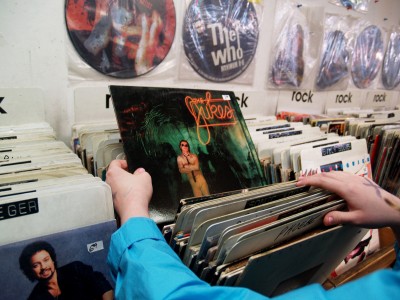
With Record Store Day celebrating its eighth year on Saturday, many are beginning to question whether or not the event is actually doing any good for the music industry.
Record Store Day began in 2008 to celebrate the role that unique, independently-owned record stores play in their communities. On this day, stores offer different kinds of exclusive promotional products, from special vinyls to CD releases. Products must be submitted and accepted by the organizers of the event in order to be considered an official Record Store Day release, and there is growing concern that smaller, independent labels are being excluded.
Do617, an events listing guide for the Boston area, is hosting a pop-up record sale on Saturday at Brighton Music Hall. Adam Parshall, content manager for Do617 and one of the employees responsible for organizing the pop-up, said the group hopes to create a unique event to showcase alienated, smaller vendors and offer an alternative to the normal Record Store Day experience.
“A lot of the smaller labels and vendors that we are bringing in deal mostly with online orders and selling vinyl at shows around Boston,” he said. “The opportunity to bring their stock to a location and event where people know they will be there and are actively looking to buy records from them is pretty special.”
Larger labels have started to participate more in Record Store Day in recent years, and with the release of merchandise from more well-known bands, local bands signed to smaller labels do not have as much of a chance to benefit from the day. This has led to the belief among many that the original goals of Record Store Day have been lost to an overwhelming sense of commercialization.
Local record stores such as Nuggets, In Your Ear and Newbury Comics will nonetheless have their doors open for Record Store Day and will offer special releases along with their usual selections. However, not all of the stores’ owners are enthusiastic about the idea of a day dedicated to record sales.
Reed Lappin, co-owner of In Your Ear in Allston, acknowledged the ongoing competition between small and large labels, calling Record Store Day “bogus” and a “hoax.”
“We don’t really participate in it here,” he said. “We just open our doors and if people come in, we’ll just sell them records we have.”
Lappin said the growing popularity and commercialization of Record Store Day stems from vinyl records becoming the “fashionable” music option.
“It’s just a big industry hype, and if you buy into it, you’re kind of a sucker,” he said. “The people who buy into it, I don’t really consider them real record collectors.”
Parshall, however, was more optimistic about the benefits of Record Store Day for the music industry. While he acknowledged that the day could become too commercialized and eventually hurt smaller labels and stores, he believes the growing popularity of vinyl records is a good sign for the music industry.
“It means that the consumer cares enough to purchase this larger format medium for listening to music and actively wants to spend more money on it and have their listening experience be more involved and more personal,” he said. “I think consumers want more out of the music they listen to, and the instant gratification of clicking ‘buy’ in iTunes or ‘play’ on Spotify isn’t enough.”
While Parshall and Lappin had different views about what Record Store Day might mean for the music industry, they both agreed on one thing. It is important to remember that the event was originally created to support local, independent record stores, not for bands or labels that are simply looking to make a profit by pressing their music onto a special collector’s edition record. They also both hope that consumers will begin to appreciate their local stores for more than just one day a year.
“It’s really about the independent stores,” Parshall said, “and making sure they are the real heroes of the day.”



















































































































